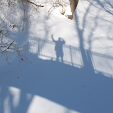Saturday, October 31, 2015
A visit to the Whistle Stop
It has been a while since I have visited the Whistle Stop Restaurant north of Monon (about three and a half years). A few days ago some visitors invited us to lunch there because a little boy had developed a fascination with trains and what better place to get a train fix than the Whistle Stop?
The museum is full of things that fascinate people who have a serious interest in the history of railroads. Our visitors were happy to examine the outside displays. There are three cabooses on display, one of which allows people inside. For our young visitors, it was the highlight of the collection. One of the others was recently added and I do not know if it was the one most visible from the road.
Or the one that is near the back by the caboose that people can enter.
In next to the caboose in front is a flat car with old farm equipment.
A great, great, great grandfather of of this boy was a section foreman and every day he and a worker would take a handcar like this to check the tracks. In the 19th century many tracks did not have a good base and track spreading was a problem. A section foreman was supposed to spot this problem and fix it. Another great, great, great grandfather of this boy was killed in a train derailment caused by spreading tracks. There were a lot of people killed in train accidents in the 19th century.
Here is a closeup of one of the other handcars in the picture above. It is missing many of its pieces. It looks like it was motorized. Now the role of handcars is taken by trucks that have rail wheels that drop down.
Every station had carts similar to the one below. Many stations, including Rensselaer, had water towers to provide water for the steam engines. The W signs were common along the railroads even when I was young. I do not know if they are still used. They told the engineer that a road crossing was ahead and that he should sound the engine's whistle.
The boards in the cart shown above have seen better days.
The little depot building serves as a gift shop. It was not open when we were there.
This crane is relatively new.
A couple box cars at the back provide a scenic backdrop but do not seem to draw much attention from visitor.
I liked the pattern of the metal grill that served as the platform of the caboose that people can enter. If you would like a technical analysis of its symmetry and tessellation type, go here.
The museum is full of things that fascinate people who have a serious interest in the history of railroads. Our visitors were happy to examine the outside displays. There are three cabooses on display, one of which allows people inside. For our young visitors, it was the highlight of the collection. One of the others was recently added and I do not know if it was the one most visible from the road.
Or the one that is near the back by the caboose that people can enter.
In next to the caboose in front is a flat car with old farm equipment.
A great, great, great grandfather of of this boy was a section foreman and every day he and a worker would take a handcar like this to check the tracks. In the 19th century many tracks did not have a good base and track spreading was a problem. A section foreman was supposed to spot this problem and fix it. Another great, great, great grandfather of this boy was killed in a train derailment caused by spreading tracks. There were a lot of people killed in train accidents in the 19th century.
Here is a closeup of one of the other handcars in the picture above. It is missing many of its pieces. It looks like it was motorized. Now the role of handcars is taken by trucks that have rail wheels that drop down.
Every station had carts similar to the one below. Many stations, including Rensselaer, had water towers to provide water for the steam engines. The W signs were common along the railroads even when I was young. I do not know if they are still used. They told the engineer that a road crossing was ahead and that he should sound the engine's whistle.
The boards in the cart shown above have seen better days.
The little depot building serves as a gift shop. It was not open when we were there.
This crane is relatively new.
A couple box cars at the back provide a scenic backdrop but do not seem to draw much attention from visitor.
I liked the pattern of the metal grill that served as the platform of the caboose that people can enter. If you would like a technical analysis of its symmetry and tessellation type, go here.
Subscribe to:
Post Comments (Atom)














2 comments:
That Whistle Stop is quite a place. We just had a delicious meal there last Sunday. It is fun for all ages.
My understanding is that the Whistle Stop will soon close for a short period for expansion. The plan is to expand the kitchen and to create a space that can be utilized for private parties.
Post a Comment